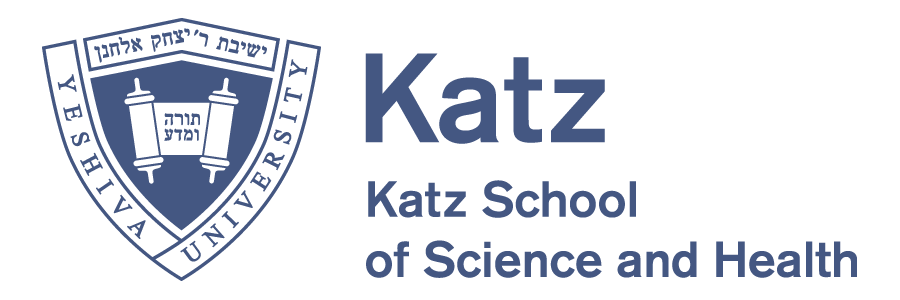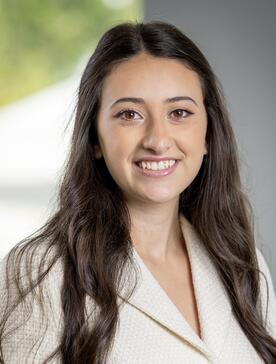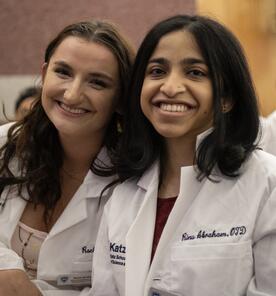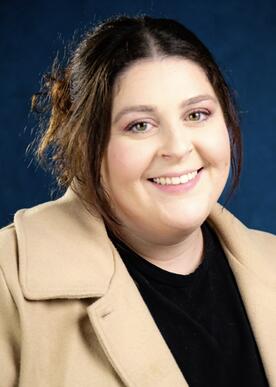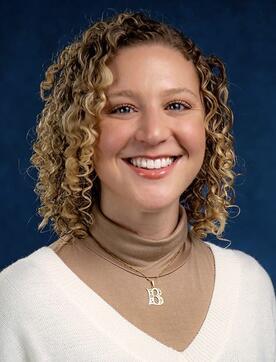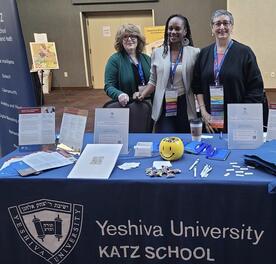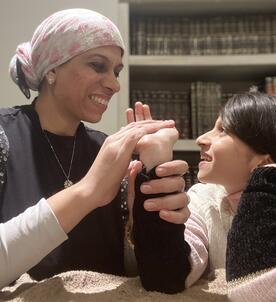
Occupational Therapy Doctorate
Making the World Smarter, Safer and Healthier
Occupational Therapy Doctorate
115 Credits I On-Campus in New York City I Full-Time (32 months)
Occupational therapists help people of all ages manage the daily activities, or occupations, they need and want to do; prevent or live better with illness, injury and disability; and promote personal health and well-being.
The Katz School’s entry-level Occupational Therapy Doctorate, the first fully accredited entry-level OT doctoral program in the New York metropolitan area, trains caring and competent scholar-practitioners to develop and deliver holistic services through the integration of theory, research and knowledge-based practice and clinical skills.
As one of these scholar-practitioners, you will be a lifelong learner, as well as a leader and an advocate for the profession in diverse local and global communities. In state-of-the-art laboratories, nationally and internationally renowned faculty will assist you in applying the knowledge that you've acquired toward building the critical skills that will enable you to promote health, well-being and resilience through occupational engagement.
Demand for qualified occupational therapists continues to increase. With YU’s hands-on, entry-level Occupational Therapy Doctorate, you’ll graduate in under three years with the expertise to help clients gain greater independence and confidence in performing the tasks of everyday living. Occupational therapy is ranked in the top 20 in U.S. News & World Report's Top Health Care Jobs. For more information about occupational therapy, visit the American Occupational Therapy Association website here.
Program Highlights
Enter with your bachelor's degree (no master's required).
State-of-the-art labs: Neurosensory, Activities of Daily Living (ADL) and Modalities and Dr. Waldman Levi's Playfulness, Growth and Development Lab.
Competitive fieldwork placements throughout New York City and across the United States.
Interprofessional learning opportunities with students and faculty from departments across the YU community.
Individually tailored 14-week capstone project where you'll pursue an area of interest in depth and gain advanced research and professional skills.
Top-ranked university in the heart of NYC: #63 in the U.S. by QS World and #1 Best Value in New York by U.S. News.
Full Program Breakdown
Occupational Therapy Doctorate
115 Credits I On-Campus in New York City I Full-Time (32 months)
Occupational therapists help people of all ages manage the daily activities, or occupations, they need and want to do; prevent or live better with illness, injury and disability; and promote personal health and well-being.
The Katz School’s entry-level Occupational Therapy Doctorate, the first fully accredited entry-level OT doctoral program in the New York metropolitan area, trains caring and competent scholar-practitioners to develop and deliver holistic services through the integration of theory, research and knowledge-based practice and clinical skills.
As one of these scholar-practitioners, you will be a lifelong learner, as well as a leader and an advocate for the profession in diverse local and global communities. In state-of-the-art laboratories, nationally and internationally renowned faculty will assist you in applying the knowledge that you've acquired toward building the critical skills that will enable you to promote health, well-being and resilience through occupational engagement.
Demand for qualified occupational therapists continues to increase. With YU’s hands-on, entry-level Occupational Therapy Doctorate, you’ll graduate in under three years with the expertise to help clients gain greater independence and confidence in performing the tasks of everyday living. Occupational therapy is ranked in the top 20 in U.S. News & World Report's Top Health Care Jobs. For more information about occupational therapy, visit the American Occupational Therapy Association website here.
Enter with your bachelor's degree (no master's required).
State-of-the-art labs: Neurosensory, Activities of Daily Living (ADL) and Modalities and Dr. Waldman Levi's Playfulness, Growth and Development Lab.
Competitive fieldwork placements throughout New York City and across the United States.
Interprofessional learning opportunities with students and faculty from departments across the YU community.
Individually tailored 14-week capstone project where you'll pursue an area of interest in depth and gain advanced research and professional skills.
Top-ranked university in the heart of NYC: #63 in the U.S. by QS World and #1 Best Value in New York by U.S. News.
-
Admissions & Financial Aid
-
Contact Us
Candidates for the Occupational Therapy Doctorate program must have completed a bachelor's degree from an accredited college or university and all prerequisite coursework outlined below. The last 60 credits of undergraduate coursework must meet a minimum 3.0 GPA.
Application Requirements
Candidates must complete the online application and submit the following materials:
- Official transcripts from all colleges and universities attended within the last 10 years.
- Résumé
- 2 letters of recommendation: at least 1 from a licensed occupational therapist; 1 letter may be from a faculty member/advisor. Letters from friends or family members will not be accepted.
- Personal statement demonstrating a commitment to contribute to and complete the program
- Verification of 40+ volunteer or observation hours from OT setting(s) of choice.
- TOEFL or IELTS scores (for candidates whose bachelor's degrees were earned at a non-English-speaking institution)
- NACES course-by-course evaluation (for degrees completed outside of the US and English-speaking Canada)
- Minimum TOEFL score on tests taken within the last two years: 100 (internet-based test)
- Minimum IELTS score on tests taken within the last two years: 7
Prerequisite Coursework
- Two courses in the humanities or social sciences (anthropology, philosophy, religion, ethics, cultural studies, group dynamics) (3 credits each)
- One course in statistics (3 credits)
- One course in human anatomy, plus lab (3 credits)
- One course in physiology, plus lab (3 credits)
- One course in human development or lifespan (3 credits)
- One course in abnormal or behavioral psychology (3 credits)
Applicants must have obtained an overall 3.0 grade point average (GPA) in program prerequisite courses (from accredited universities) within the last 10 years. Applications may be submitted during enrollment in an undergraduate degree program or during completion of prerequisite coursework. The last 60 credits of undergraduate coursework must meet a minimum 3.0 GPA.
Tuition, Fees, and Scholarships
Click here to view estimated tuition and fees for the 2024-25 academic year. The Office of Student Finance maintains current tuition, fees, and refund policies and procedures for all graduate programs.
All applicants are automatically considered for scholarships. You do not need to submit any additional information. Awards are determined during the application review process.
Please schedule an appointment with an admissions director if you have questions about financial aid opportunities and financing your graduate degree. We can do a preliminary transcript review and discuss your admissions and financing options with the Katz School.
Please note: Students may apply external scholarships (e.g., Fulbright, NSF, government support) towards their tuition but may not combine multiple scholarships from Yeshiva University or the Katz School.
COVID-19 Vaccination
Please note that the University requires its students to be fully-vaccinated against COVID-19. Students attending a program with a clinical training component are subject to this policy. Medical and religious exemptions generally are not available for students in a University clinical training program due to the requirements of external clinical sites and other circumstances which would place an undue burden on the University to provide the accommodation. You should bear this in mind when applying to the program. The University will not refund any fees or other payments if you are unable to enroll or otherwise complete the program.
Background Checks
Please note that a felony conviction or previous criminal record could affect eligibility for clinical training placement and, as a result, ability to complete the program requirements. Clinical training sites often require a background check prior to placement. Additionally, a felony conviction may affect a graduate's ability to sit for the national certification examination, as well impact eligibility to obtain state licensure.
Applicants for the NBCOT exam are required to answer Character Review Questions and submit a background check. For more information on NBCOT’s policies see: www.nbcot.org/en/Students/Services.
Graduate Admissions
General Inquiries
Join our Community

Candidates for the Occupational Therapy Doctorate program must have completed a bachelor's degree from an accredited college or university and all prerequisite coursework outlined below. The last 60 credits of undergraduate coursework must meet a minimum 3.0 GPA.
Application Requirements
Candidates must complete the online application and submit the following materials:
- Official transcripts from all colleges and universities attended within the last 10 years.
- Résumé
- 2 letters of recommendation: at least 1 from a licensed occupational therapist; 1 letter may be from a faculty member/advisor. Letters from friends or family members will not be accepted.
- Personal statement demonstrating a commitment to contribute to and complete the program
- Verification of 40+ volunteer or observation hours from OT setting(s) of choice.
- TOEFL or IELTS scores (for candidates whose bachelor's degrees were earned at a non-English-speaking institution)
- NACES course-by-course evaluation (for degrees completed outside of the US and English-speaking Canada)
- Minimum TOEFL score on tests taken within the last two years: 100 (internet-based test)
- Minimum IELTS score on tests taken within the last two years: 7
Prerequisite Coursework
- Two courses in the humanities or social sciences (anthropology, philosophy, religion, ethics, cultural studies, group dynamics) (3 credits each)
- One course in statistics (3 credits)
- One course in human anatomy, plus lab (3 credits)
- One course in physiology, plus lab (3 credits)
- One course in human development or lifespan (3 credits)
- One course in abnormal or behavioral psychology (3 credits)
Applicants must have obtained an overall 3.0 grade point average (GPA) in program prerequisite courses (from accredited universities) within the last 10 years. Applications may be submitted during enrollment in an undergraduate degree program or during completion of prerequisite coursework. The last 60 credits of undergraduate coursework must meet a minimum 3.0 GPA.
Tuition, Fees, and Scholarships
Click here to view estimated tuition and fees for the 2024-25 academic year. The Office of Student Finance maintains current tuition, fees, and refund policies and procedures for all graduate programs.
All applicants are automatically considered for scholarships. You do not need to submit any additional information. Awards are determined during the application review process.
Please schedule an appointment with an admissions director if you have questions about financial aid opportunities and financing your graduate degree. We can do a preliminary transcript review and discuss your admissions and financing options with the Katz School.
Please note: Students may apply external scholarships (e.g., Fulbright, NSF, government support) towards their tuition but may not combine multiple scholarships from Yeshiva University or the Katz School.
COVID-19 Vaccination
Please note that the University requires its students to be fully-vaccinated against COVID-19. Students attending a program with a clinical training component are subject to this policy. Medical and religious exemptions generally are not available for students in a University clinical training program due to the requirements of external clinical sites and other circumstances which would place an undue burden on the University to provide the accommodation. You should bear this in mind when applying to the program. The University will not refund any fees or other payments if you are unable to enroll or otherwise complete the program.
Background Checks
Please note that a felony conviction or previous criminal record could affect eligibility for clinical training placement and, as a result, ability to complete the program requirements. Clinical training sites often require a background check prior to placement. Additionally, a felony conviction may affect a graduate's ability to sit for the national certification examination, as well impact eligibility to obtain state licensure.
Applicants for the NBCOT exam are required to answer Character Review Questions and submit a background check. For more information on NBCOT’s policies see: www.nbcot.org/en/Students/Services.

